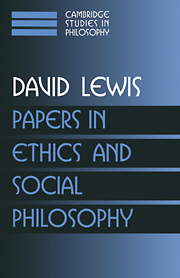Book contents
- Frontmatter
- Contents
- Introduction
- 1 Semantic analyses for dyadic deontic logic
- 2 A problem about permission
- 3 Reply to McMichael
- 4 Why ain'cha rich?
- 5 Desire as belief
- 6 Desire as belief II
- 7 Dispositional theories of value
- 8 The trap's dilemma
- 9 Evil for freedom's sake?
- 10 Do we believe in penal substitution?
- 11 Convention: Reply to Jamieson
- 12 Meaning without use: Reply to Hawthorne
- 13 Illusory innocence?
- 14 Mill and Milquetoast
- 15 Academic appointments: Why ignore the advantage of being right?
- 16 Devil's bargains and the real world
- 17 Buy like a MADman, use like a NUT
- 18 The punishment that leaves something to chance
- 19 Scriven on human unpredictability (with Jane S. Richardson)
- Index
9 - Evil for freedom's sake?
Published online by Cambridge University Press: 24 December 2009
- Frontmatter
- Contents
- Introduction
- 1 Semantic analyses for dyadic deontic logic
- 2 A problem about permission
- 3 Reply to McMichael
- 4 Why ain'cha rich?
- 5 Desire as belief
- 6 Desire as belief II
- 7 Dispositional theories of value
- 8 The trap's dilemma
- 9 Evil for freedom's sake?
- 10 Do we believe in penal substitution?
- 11 Convention: Reply to Jamieson
- 12 Meaning without use: Reply to Hawthorne
- 13 Illusory innocence?
- 14 Mill and Milquetoast
- 15 Academic appointments: Why ignore the advantage of being right?
- 16 Devil's bargains and the real world
- 17 Buy like a MADman, use like a NUT
- 18 The punishment that leaves something to chance
- 19 Scriven on human unpredictability (with Jane S. Richardson)
- Index
Summary
Christianity teaches that whenever evil is done, God had ample warning. He could have prevented it, but He didn't. He could have stopped it midway, but He didn't. He could have rescued the victims of the evil, but – at least in many cases – He didn't. In short, God is an accessory before, during, and after the fact to countless evil deeds, great and small.
An explanation is not far to seek. The obvious hypothesis is that the Christian God is really some sort of devil. Maybe He is a devil as popularly conceived, driven by malice. Or maybe He is unintelligibly capricious. Or maybe He is a fanatical artist who cares only for the aesthetic quality of creation – perhaps the abstract beauty of getting rich variety to emerge from a few simple laws, or perhaps the concrete drama of human life with all its diversity – and cares nothing for the good of the creatures whose lives are woven into His masterpiece. (Just as a tragedian has no business providing a happy end out of compassion for his characters.) But no; for Christianity also teaches that God is morally perfect and perfectly benevolent, and that He loves all of His creatures; and that these things are true in a sense not a million miles from the sense in which we attribute morality, benevolence, or love to one another.
We turn next to the hypothesis that God permits evil-doing for the sake of its good effects.
- Type
- Chapter
- Information
- Papers in Ethics and Social Philosophy , pp. 101 - 127Publisher: Cambridge University PressPrint publication year: 1999
- 1
- Cited by



